1. Introduction
Why We Need to Understand What Cats Can Eat
As responsible pet owners, it’s essential to know which foods are safe for our furry friends. Cats, specifically, have unique dietary needs that differ greatly from humans. They are obligate carnivores, which means their diet is primarily meat-based and lacks carbohydrates and sugars. Many foods that are safe for humans can cause digestive distress or serious health complications in cats.
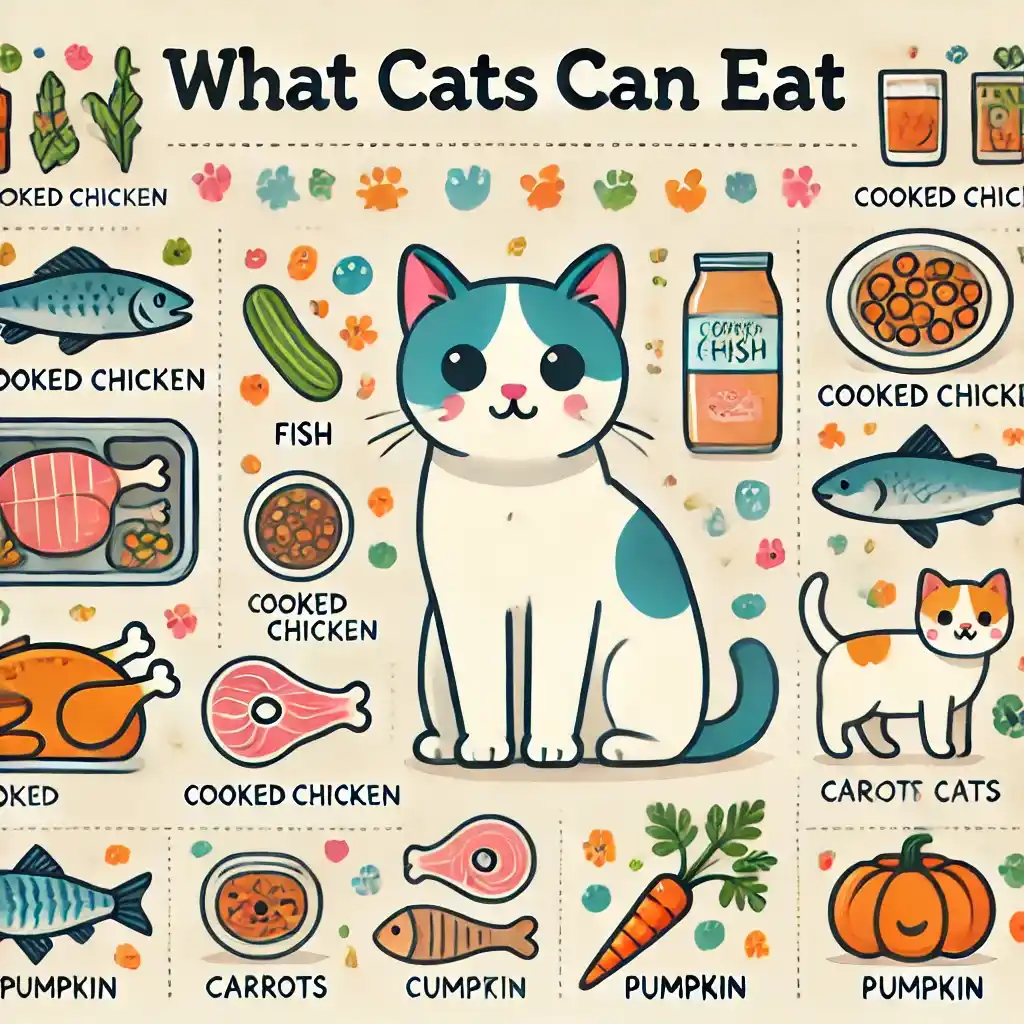
Understanding the risks associated with giving cats human food, like cake, can prevent accidental poisoning or health issues. This guide aims to clarify why it’s essential to avoid feeding cats food intended for humans and provides insight into why their nutritional needs are different.
The Curiosity of Cats Around Human Foods
Cats are naturally curious animals. Their inquisitive nature often brings them to the kitchen or dining table, sniffing around our food, and cake is no exception. Cats are often drawn to human foods out of interest, not hunger, and sometimes, we mistake their curiosity for a desire to taste the food. However, even a small amount of certain ingredients, such as sugar, chocolate, or dairy, can cause harm to a cat’s health.
Understanding what is safe and unsafe for cats to eat helps keep them healthy and minimizes the risks associated with accidentally sharing foods that might seem harmless but can be detrimental to their well-being.
2. Can Cats Eat Cake?
A Brief Answer to the Question
The short answer is no, cats should not eat cake. While a very small bite might not immediately harm them, cakes contain ingredients that can cause a variety of health issues if ingested in larger amounts. Many ingredients in cake, such as sugar, fats, dairy, and sometimes chocolate, are not only unnecessary for cats but can also lead to health complications.
Understanding Cake Ingredients and Their Impact on Cats
The typical ingredients used in making cake are not suited for a cat’s diet. Cakes are often high in sugar, fats, and other additives that cats can’t properly digest. Let’s take a look at each primary ingredient and how it may affect a cat’s health:
- Sugar: Provides no nutritional benefit to cats and can contribute to obesity, diabetes, and dental problems.
- Fats: Excessive fats can lead to obesity, pancreatitis, and other digestive issues.
- Dairy Products: Most cats are lactose intolerant, and consuming dairy can cause digestive upset, including diarrhea.
- Eggs: Although eggs are a source of protein, when combined with other cake ingredients, they become unhealthy for cats.
- Chocolate: Contains theobromine, which is toxic to cats, causing muscle tremors, seizures, or even death in severe cases.
Due to these factors, cake is not recommended for cats, and even small portions should be avoided whenever possible.
3. Key Ingredients in Cake: Safe or Dangerous for Cats?
Sugar: Is It Harmful for Cats?
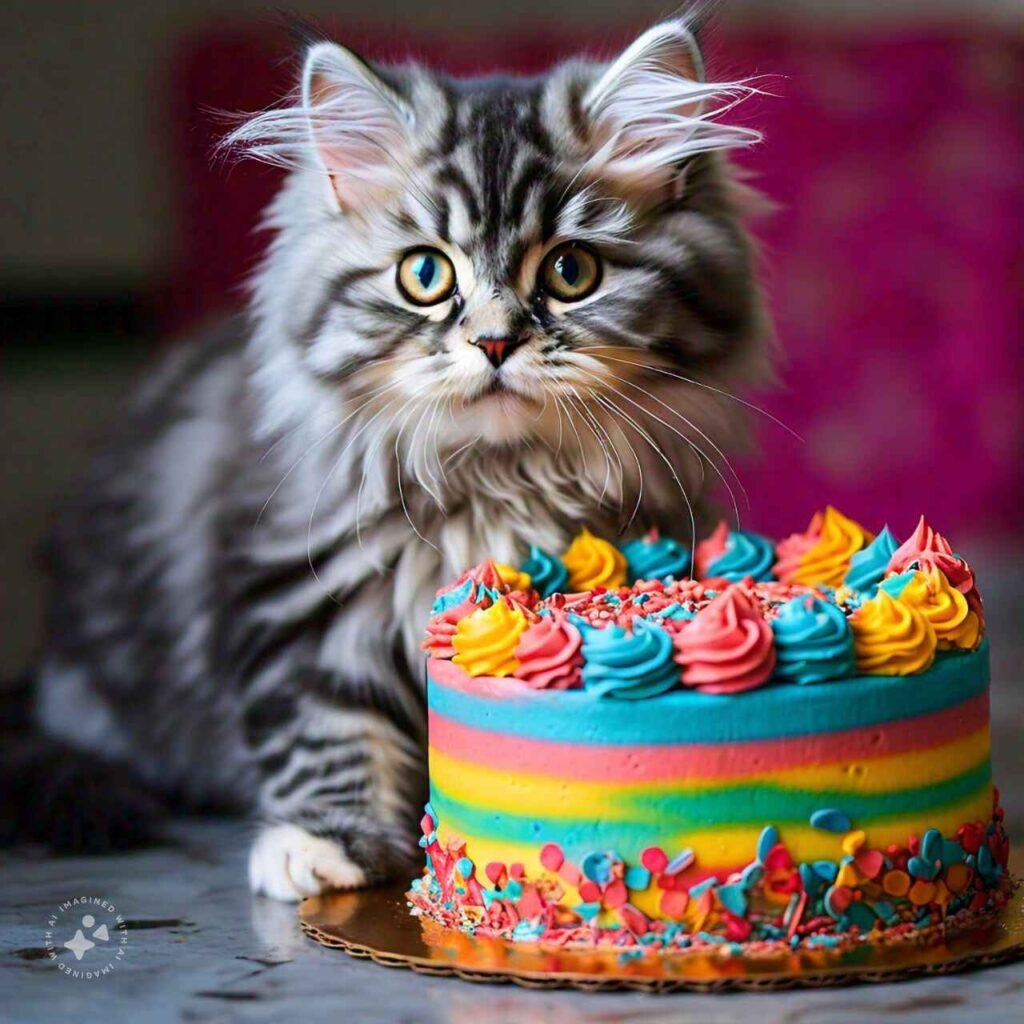
Sugar offers no nutritional value to cats and can lead to various health issues over time. Cats lack the taste receptors to enjoy sweets, which is a good indicator that sugar is unnecessary in their diet. Consuming sugar regularly can lead to obesity, diabetes, and dental problems, making it a harmful addition to their diet.
Butter and Fats: Health Risks for Felines
While a small amount of fat is essential for cats, the levels of butter and other fats in cake are far too high. Cats’ digestive systems aren’t designed to process excessive fat, leading to digestive issues and weight gain. In severe cases, high-fat foods can lead to pancreatitis, a serious and painful condition that requires veterinary care.
Dairy Products in Cake: Lactose Intolerance in Cats
Most adult cats are lactose intolerant, meaning they don’t produce enough lactase, the enzyme required to digest lactose found in dairy products. When cats consume dairy, it can cause gastrointestinal discomfort, leading to symptoms like diarrhea, gas, and bloating.
Eggs: Safe in Moderation?
Eggs can be a good source of protein for cats when cooked and served plain. However, eggs in cake are mixed with other unhealthy ingredients, like sugar and fats, which can counteract any potential nutritional benefits. If you wish to give your cat eggs, it’s best to cook them plain without adding any salt, butter, or seasonings.
Flour: Digestibility in Cats
Flour is generally not harmful but offers little to no nutritional value to cats. As obligate carnivores, cats’ bodies are adapted to digest proteins rather than carbohydrates. Flour-based foods like cake are high in carbs, which can contribute to weight gain, especially when paired with sugar and fats.
4. The Role of Sugar and Cats’ Diet
Why Cats Don’t Need Sugar
Cats are naturally carnivores, and their bodies are designed to digest high-protein, low-carbohydrate diets. Unlike humans, who often crave sweets, cats have no need for sugar in their diet. In fact, their lack of sweet taste receptors highlights that sugar doesn’t have a place in a cat’s diet. Consuming sugar disrupts their natural dietary balance, leading to health complications if it becomes a regular part of their intake.
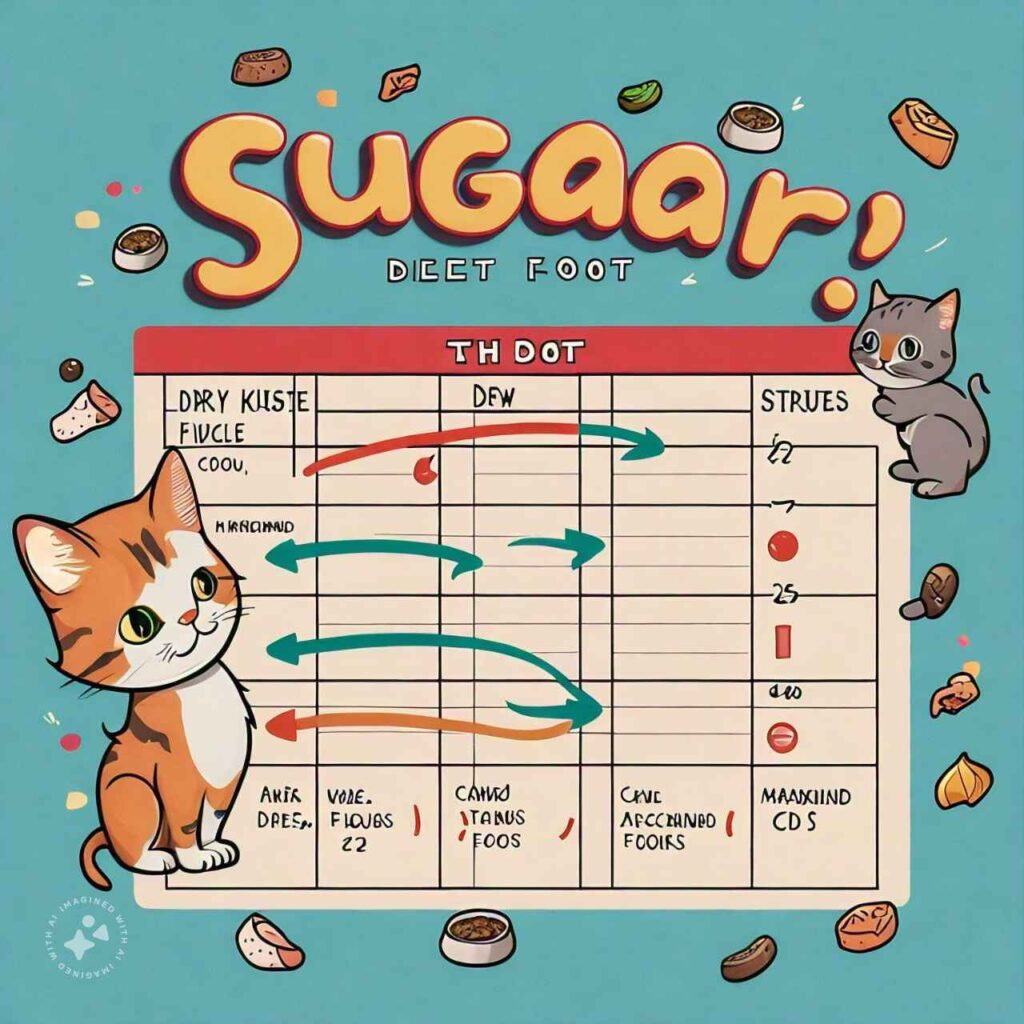
Potential Health Risks from Sugary Foods
Feeding cats sugary foods like cake can cause several health issues. Cats that consume sugar regularly are at a higher risk of developing obesity, as they are not naturally inclined to burn off high-carb foods. Sugar can also lead to dental problems in cats, as it promotes tooth decay and gum disease. Long-term consumption of sugary foods may result in metabolic disorders such as diabetes, a condition that can severely affect a cat’s quality of life.
5. Chocolate and Other Dangerous Additives in Cake
Why Chocolate Is Toxic to Cats
Chocolate contains theobromine and caffeine, compounds that are highly toxic to cats. Even a small amount of chocolate can cause serious health issues, including muscle tremors, seizures, and, in severe cases, death. Dark chocolate contains higher levels of theobromine than milk chocolate, making it especially dangerous. Under no circumstances should cats be given chocolate, and it’s important to ensure cakes and other baked goods are kept out of reach.
Harmful Additives: Vanilla Extract, Artificial Sweeteners, and More
Many cakes contain flavorings and sweeteners that are harmful to cats. Vanilla extract, for instance, often contains alcohol, which is toxic to cats. Artificial sweeteners, especially xylitol, can also be extremely dangerous, causing hypoglycemia (a rapid drop in blood sugar) and potential liver failure. Keeping these additives away from cats is essential for their health.
6. What Happens If a Cat Eats Cake?
Immediate Symptoms to Watch For
If a cat consumes cake, it’s important to monitor them for any symptoms of discomfort or toxicity. Common signs include vomiting, diarrhea, and lethargy. Hyperactivity or other behavioral changes may also occur, especially if the cake contained sugar, chocolate, or dairy products. If symptoms are severe or persist, seeking veterinary attention is advised.
Long-term Health Implications
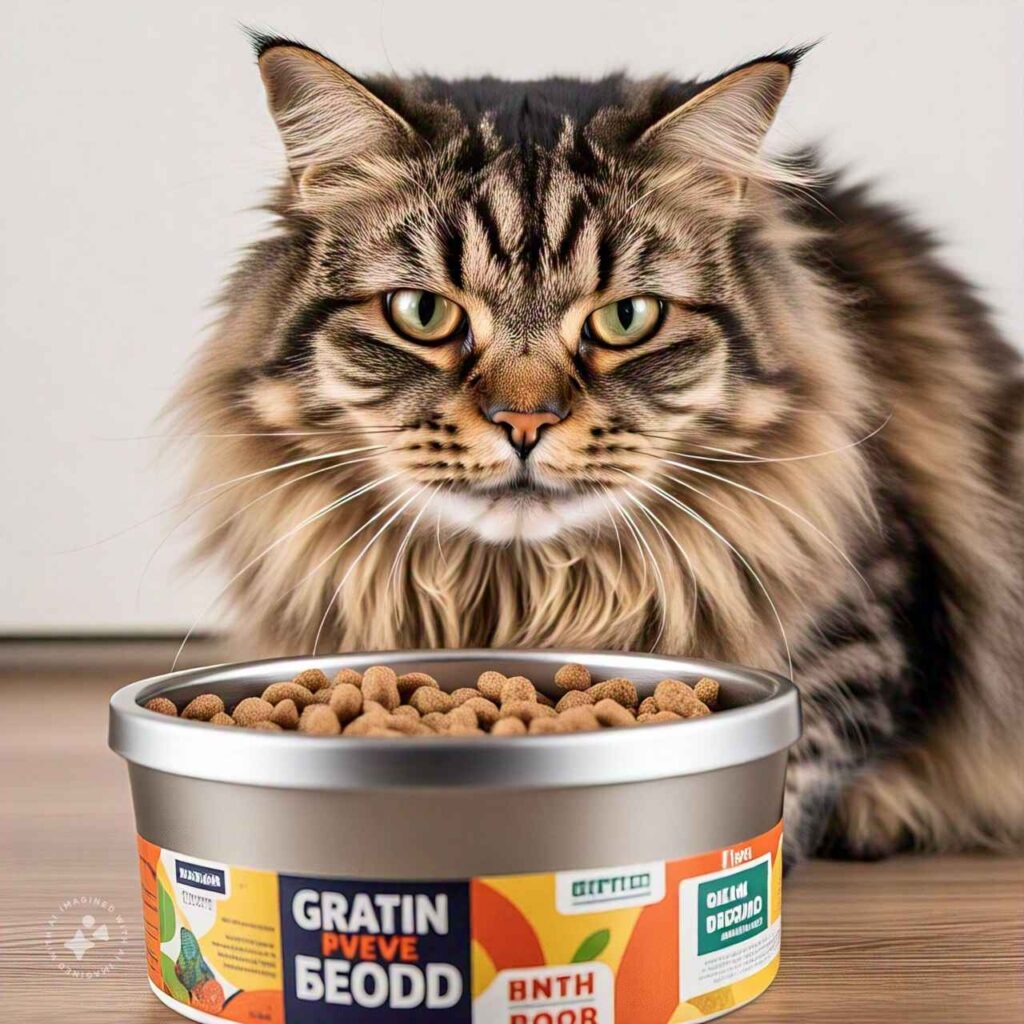
Regular exposure to sugary, fatty, or chocolatey foods can lead to long-term health issues in cats, such as obesity, diabetes, and pancreatitis. Keeping foods like cake out of reach and maintaining a proper diet ensures that cats avoid these health complications and stay within a healthy weight range.
7. Safe Treat Alternatives for Cats
Cat-friendly Treat Ideas
Instead of giving cake, try feeding cats treats designed specifically for them. Some suitable cat-friendly treats include:
- Freeze-dried meats: Pure protein sources that align with a cat’s natural diet.
- Small pieces of cooked, unseasoned chicken or fish: Easy to digest and enjoyable for most cats.
- Commercial cat treats: Many pet stores offer safe, nutritionally balanced treats for cats.
DIY Cat Treat Recipes
Here’s a simple recipe for a cat-friendly treat:
- Ingredients: One egg, one tablespoon of cooked and mashed pumpkin, and finely chopped cooked chicken.
- Preparation: Mix all ingredients, shape into small balls, and bake at 350°F for 10-12 minutes.
- Serving: Allow to cool before serving to your cat.
This recipe offers protein and fiber and is a safe, satisfying alternative to cake.
8. Frequently Asked Questions
Can Cats Have Small Bites of Cake?
While a tiny lick or crumb may not harm your cat, it’s generally best to avoid giving them cake at all. Cats don’t benefit from the ingredients in cake, and regular exposure can lead to health issues over time.
What Should I Do if My Cat Accidentally Eats Cake?
If your cat consumes cake, observe them for any signs of digestive upset or toxicity. If they exhibit symptoms like vomiting or diarrhea, contact a veterinarian, especially if the cake contained chocolate or artificial sweeteners.
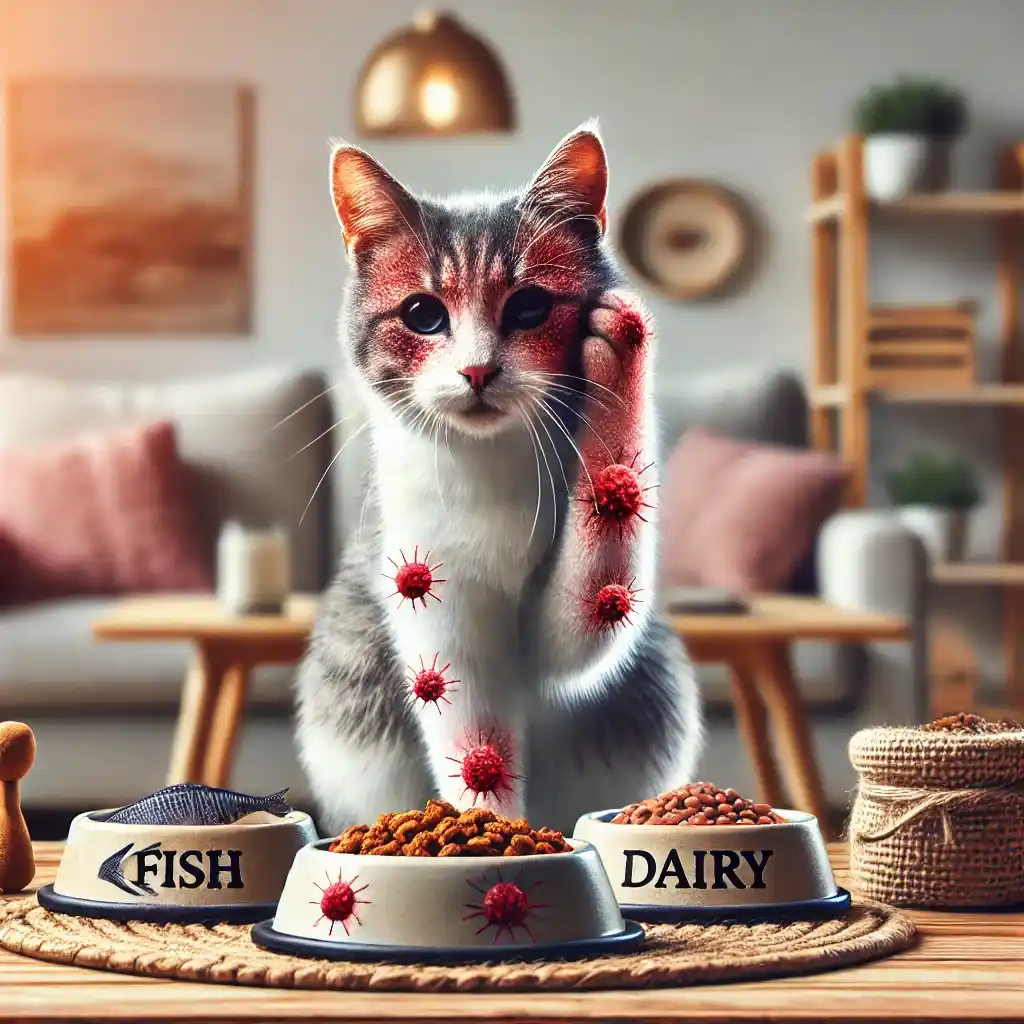
Are Any Types of Cake Safer Than Others?
No type of cake is truly safe for cats. However, cakes without chocolate or artificial sweeteners may pose fewer risks. Still, it’s best to avoid giving your cat any cake and stick to safe, cat-specific treats instead.
9Safe vs. Unsafe Ingredients for Cats in Cakes and Cat Treats
| Ingredient Type | Commonly Found in Cakes | Safe for Cats | Why/Why Not |
|---|---|---|---|
| Sugar | Yes | ❌ Unsafe | Cats cannot taste sweetness and do not process sugar well. It can lead to obesity, diabetes, and dental problems. |
| Butter/Fats | Yes | Limited | Cats can have small amounts of fats, but the high fat content in cakes can cause digestive issues and obesity. |
| Dairy (Milk, Cream) | Yes | Limited | Most adult cats are lactose intolerant, causing stomach upset and diarrhea if consumed. |
| Chocolate | Yes | ❌ Toxic | Chocolate contains theobromine, which is highly toxic to cats and can cause seizures or even be fatal. |
| Vanilla Extract | Yes (often contains alcohol) | ❌ Unsafe | Alcohol in vanilla extract is toxic to cats, leading to disorientation, vomiting, and potentially liver damage. |
| Artificial Sweeteners | Yes (such as xylitol) | ❌ Toxic | Xylitol causes a rapid insulin release, leading to hypoglycemia (low blood sugar) and can cause liver failure in cats. |
| Eggs | Yes | ✅ Safe (in moderation) | Eggs are a good source of protein but should be cooked plain, without additives like sugar or fat. |
| Flour | Yes | ❌ Not Ideal | Flour has no nutritional benefit for cats and, in large amounts, can contribute to weight gain and digestive issues. |
| Fruit (Pumpkin) | Sometimes (in specific cake recipes) | ✅ Safe (small amounts) | Pumpkin is fiber-rich and safe in small amounts, often beneficial for digestion but should not contain added sugar or spices. |
| Catnip or Silvervine | No | ✅ Safe | Although not found in cakes, catnip and silvervine are enjoyable and safe for cats, often found in cat treats as stimulants and mild relaxants. |
| Cooked Meat (Chicken) | Rarely | ✅ Safe | Plain, cooked chicken is safe for cats as it provides necessary protein without added sugars, fats, or harmful ingredients. |
| Fish Oil | No | ✅ Safe (in moderation) | Often added to cat treats for flavor and nutrition, fish oil provides Omega-3 fatty acids beneficial for skin and coat health |
10FAQs
Can cats eat a small piece of cake?
No, cats should avoid cake entirely.
Even a small piece can contain harmful ingredients like sugar, dairy, or chocolate, which can upset their stomach or be toxic.
Why is chocolate dangerous for cats?
Chocolate has theobromine and caffeine, which are highly toxic to cats. Even a small amount can cause seizures, tremors, or, in severe cases, be fatal.
Are any cake ingredients safe for cats?
Some plain ingredients, like cooked eggs or small amounts of pumpkin, are safe. However, once mixed with sugar or dairy, even these become unhealthy for cats.
What should I do if my cat eats cake?
Monitor for symptoms like vomiting, diarrhea, or lethargy. If symptoms are severe or chocolate is involved, contact a veterinarian immediately.
What treats are safe for cats instead of cake?
Try small pieces of plain, cooked chicken or cat-safe treats like freeze-dried meats. These treats are safer and align with a cat’s dietary needs
1 Conclusion
Key Takeaways
Cats should avoid cake, as its ingredients can cause digestive issues, toxicity, and long-term health risks. Sugars, dairy, and chocolate, common in many cakes, can all negatively impact a cat’s health.
Final Thoughts on Cats and Cake
While it may be tempting to share our sweet treats with our cats, it’s always safer to provide them with treats made specifically for feline consumption. By understanding what’s safe and what isn’t, pet owners can ensure that their cats live long, healthy lives without the risks associated with human food
